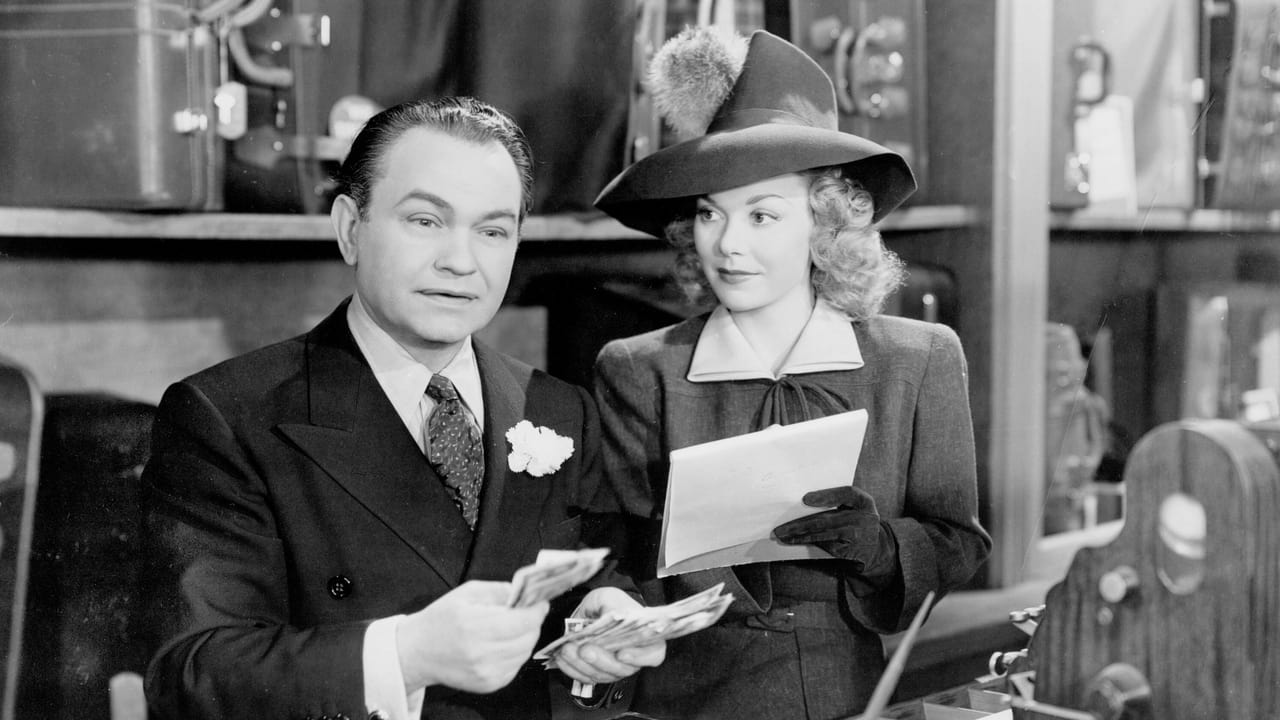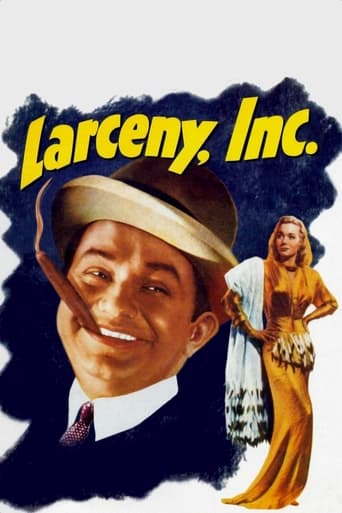

Disappointment for a huge fan!
... View MoreBoring
... View MoreA terrific literary drama and character piece that shows how the process of creating art can be seen differently by those doing it and those looking at it from the outside.
... View MoreA clunky actioner with a handful of cool moments.
... View MoreA comedy directed by Lloyd Bacon that was written by Everett Freeman and Edwin Gilbert from a play by Laura and S.J. Perelman. There are lots of familiar stock players in this one, but the main characters are Edward G. Robinson, Broderick Crawford (playing an even dumber character than usual), and Edward Brophy (larger than his normal sidekick roles?). Though Jane Wyman received second billing, Jack Carson third, and Anthony Quinn fourth, their roles are small in comparison. Harry Davenport is appropriated billed at sixth though; John Qualen, Grant Mitchell, George Meeker, and even Jackie Gleason are in this one.The film starts with a prison baseball game to establish the relationship between Robinson, the leader, and Crawford, his flunkie. The two are about to released from prison after serving their time; Brophy is the part of the gang who has been tending to things while they were on the inside. Robinson is determined to go legitimate and promises Wyman, who's like a daughter to him, that he will. However, when the bank turns him down for the loan he needs to open a dog track, he decides that he'll have to get his initial stake his old way.He notices that there's a luggage business next door to the bank whose basement may provide access to it. He "buys" the business from Davenport and soon has Crawford digging in the basement. Brophy acquires the needed supplies and otherwise assists Robinson with keeping customers out of the store! However, the local businessmen befriend Robinson and ask him to help them by getting the city to finish the subway construction, which has the street torn up in front of their businesses. Though Robinson likes the fact that there is limited pedestrian traffic into his store, he accidentally helps them, becoming their hero.Wyman, who's being romantically pursued by luggage manufacturing rep (Carson), gets wise to Robinson's plans. She then enlists Carson's unknowing help to keep customers coming through the store to delay or prevent the crime. Quinn, "The Man" inside the prison, gets wind of the job Robinson & Co. are working and breaks out in order to muscle in on the deal.By this time, Robinson has become a respected businessman on his street, with the bank wanting to buy his business for 15 times what he paid for it. He has just convinced his "partners in (the would be) crime" to go straight and accept the bank's offer when Quinn shows up.The ending of this film is the only real downer ... it's worse than silly.
... View MorePrisoners Edward G Robinson (Pressure) and Broderick Crawford (Jug) are released from prison and team up with Edward Brophy (Weepy). Robinson wants to go legitimate but it doesn't take much to convince him to go back to tried and tested means of making a living, particularly, when a bank refuses to give him a loan. So, they decide to get the money via another route. Literally. They buy a luggage shop next to the bank and plan to tunnel into the bank via an adjoining cellar. Well, their plans change once the luggage shop becomes successful, until a certain escaped hard-man Anthony Quinn (Leo) shows up. The bank robbery had initially been his idea when all were inside jail together.This film is a comedy with a great premise. Once in the luggage shop, Robinson and his gang couldn't give two figs about making any sales and positively loathe the idea of having customers disturb them while they are trying to dig a tunnel to their fortune. Some of the comedic situations are brilliant and just what you wish you could get away with in a real-life sales environment in light of today's politically correct nonsense about the customer always being right. Not here. Ha ha.The cast are good for their roles but I have to drop some marks for the slapstick scenes. Not my thing at all. Quinn plays his role well and is suitably menacing as the villain of the piece, and this contrasts well with the amusing antics of the bungling trio in the luggage shop who end up with a successful business that they didn't want. And they have a brilliant hiding place for a gun. They are sooooo not interested in making a success of the business but fate conspires against them. Entertaining film.
... View MoreTop-notch comedic performances are finely delivered by Edward G. Robinson, Broderick Crawford and Edward Brophy in this hilarious story about three ex-cons, who buy a Luggage Shop that is next door to a bank. The shop is used as a clever front, while they try to tunnel into the the banks vault. The comical antics are endless and the crooks soon discover selling the luggage is profitable and much easier, until the unsavoury Anthony Quinn discovers their plan, and the three are forced to resume breaking into the bank. With very funny situations and witty dialogue, all the performers mesh perfectly which helps this story to move along at a pleasing pace, creating a very rewarding comedy gem. A full synopsis cannot compare to the fulfilling enjoyment brought by watching this 1942 film, and I highly suggest the viewing is well worthwhile.
... View MoreNow personally I don't see what Anthony Quinn was squawking about in Larceny, Inc. Edward G. Robinson and sidekicks Edward Brophy and Broderick Crawford take over a caper that Quinn has planned. Robinson serves his time in prison and Quinn gets denied parole. It's not like Quinn took a copyright out on the idea and you can't count on him busting out of stir.Nevertheless that's what Quinn does and he does see things differently which is the whole basis for the plot of Larceny, Inc.Edward G. Robinson, as he did in a number of films, gets a chance to satirize his own gangster image and he does it quite well. This was one of his last films under his Warner Brothers contract and he went out in style. Robinson would be back at Warner Brothers in the latter half of the Forties with Key Largo which was definitely not a comedy.Robinson is the brains and he gets stalwart support from Edward Brophy and Broderick Crawford, two guys who at that time usually played simple minded lovable lugs. Brophy went with the flow, but Crawford was quoted as saying that he was not the world's greatest wit, but he always resented playing half a one. He got his big chance at the end of the Forties with All the King's Men and an Oscar.Robinson's adopted daughter is Jane Wyman and her beau is salesman Jack Carson. Wyman was also a few years from an Oscar for Johnny Belinda and Carson did break the mold of playing lovable blowhards.It's a pretty funny film, best scene is when Crawford strikes a pipeline in the basement and for a minute they think they've struck oil in New York City.And already refined too.
... View More